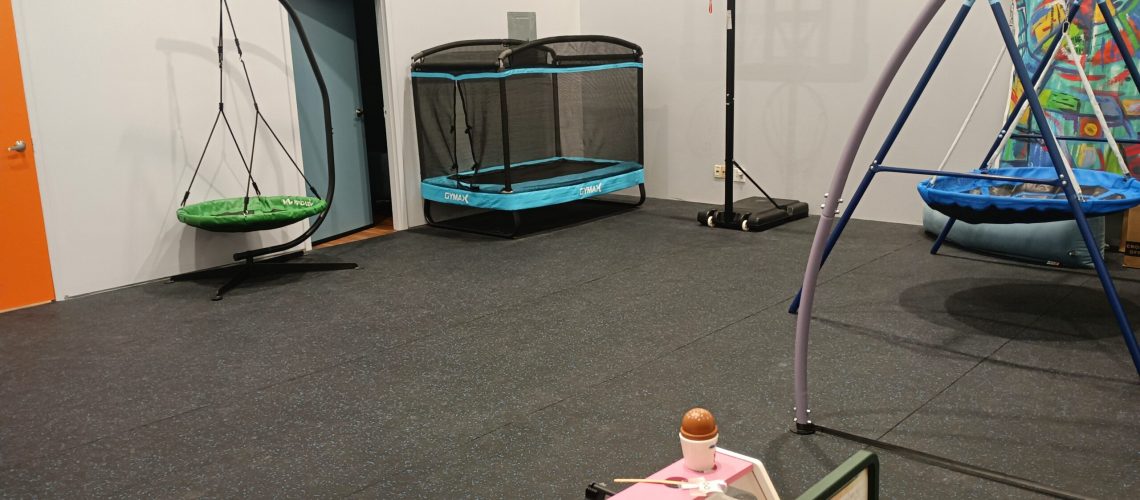Many parents come to us after trying approaches that focused heavily on compliance — often because that’s what funding covers or what professionals recommend. While these methods may produce short-term results, parents often share that they don’t sit right in the long run. That’s because real growth doesn’t come from forcing compliance. It comes from helping children feel safe, connected, and understood.
Principle 1: Safety Comes First
Children can’t learn or connect until they feel safe. Guided by polyvagal theory, our team focuses on creating environments where children’s nervous systems can shift out of “fight, flight, or shutdown” and into a state of calm connection.
At NeuroNest, this looks like:
- A sensory-aware day program with built-in movement breaks, flexible seating, and quiet spaces.
- Access to our gym with rubber flooring, trampoline, swings, and a basketball hoop — a place to release energy and regulate through play.
- A sensory room with a six-foot bubble tube, glow-in-the-dark rug, LED lights, and calming music — a retreat when children need to regulate.
When children feel safe in their bodies and environment, everything else becomes possible.
Principle 2: Relationship Over Compliance
Instead of pushing children to comply, we prioritize connection and trust. We know kids are more likely to try hard things when they feel understood and respected.
Every day at NeuroNest begins with a check-in, where children use visual mood scales or journals to share how they’re feeling. Staff respond with co-regulation, not correction. Peer connection is woven throughout the day in low-pressure ways — from “friendship circles” to cooperative play — so kids can build authentic relationships without being forced.
Principle 3: Reducing Demands, Supporting Autonomy
For children with anxiety or PDA profiles, demands can feel overwhelming. That’s why we reduce unnecessary demands and give children meaningful choices.
- Staff use statements instead of questions when children are dysregulated.
- Curiosity statements like “I wonder what would make this easier” replace ultimatums.
- Open collaboration is encouraged when children are calm.
This doesn’t mean letting go of expectations — it means presenting them in ways that lower pressure and preserve dignity.
Principle 4: Building Self-Awareness and Advocacy
Children are supported to notice their internal states and communicate their needs. Whether through art, storytelling, or reflection circles, they learn to say: “I feel overwhelmed,” “I need a break,” or “My heart is beating fast.”
At NeuroNext, our evening program for teens, this extends to exploring identity, independence, and confidence:
- Cooking and grocery shopping build real-world skills.
- Group discussions help teens explore emotions and self-expression.
- Art therapy and life-skills practice give them tools for both self-regulation and self-advocacy.
Principle 5: Joy and Strengths at the Center
We believe that therapy should nurture not only resilience, but also joy. At NeuroNest and NeuroNext, children’s strengths and interests shape their experiences:
- Creative expression through art, music, and storytelling.
- Outdoor play, nature walks, and community outings to connect with the world.
- Opportunities to share passions, from Minecraft chats to animal sanctuary visits.
Joy isn’t a “reward” for compliance — it’s an essential ingredient for growth.
What a Day Looks Like at NeuroNest
A typical day blends structure with flexibility. Children might begin with a calm arrival and mood check-in, move into a group activity exploring emotions or executive functioning, and then shift into creative projects, outdoor movement, or life-skills practice. Throughout the day, sensory breaks are built in, and staff use co-regulation to guide children back to calm when needed
NeuroNest Daily Program Schedul…
.
Every Thursday, children go on community outings — to the library, nature areas, grocery stores, or recreation centers — so they can practice skills in real-world environments. These outings are often where kids surprise themselves the most.
Why Families Choose NeuroNest and NeuroNext
- Clinical foundation: Supervised by an MSW, with a multidisciplinary team of therapists and child & youth workers.
- Low ratios: 1:3 at NeuroNest and 1:4 at NeuroNext, so every child is closely supported.
- Flexible schedules: 1–3 days per week for NeuroNest; twice weekly evenings for NeuroNext.
- Funding options: OAP-eligible and often covered under extended benefits.
- Community focus: Groups are intentionally matched by age, interests, and identity expression to foster belonging.
Parent Takeaways
- Safety and connection come before learning.
- Relationship matters more than compliance.
- Reducing demands helps children feel safe and capable.
- Self-awareness and advocacy are skills children can learn and practice.
- Joy, strengths, and community are at the heart of real growth.
Recommended Resources
- Deb Dana – Polyvagal Theory Made Simple (book)
- The PDA Society (UK) – www.pdasociety.org.uk
- NeuroClastic – www.neuroclastic.com – autistic voices on affirming approaches

